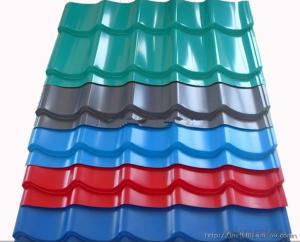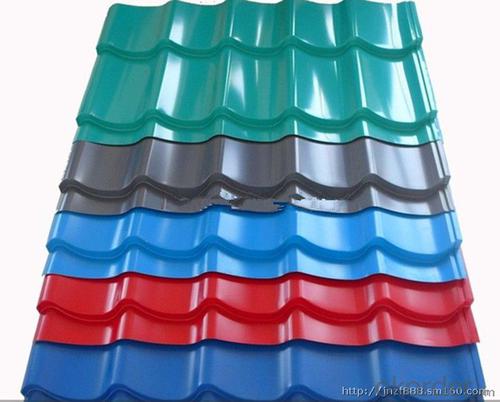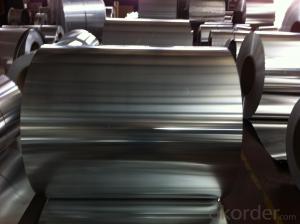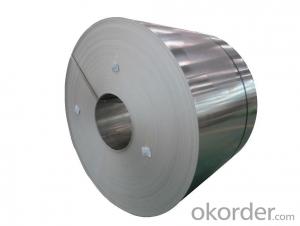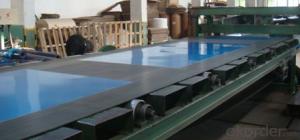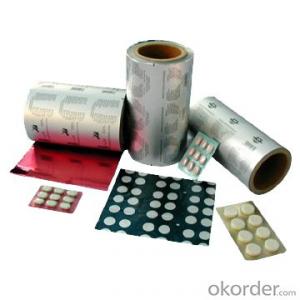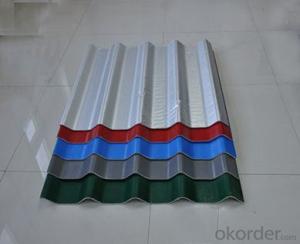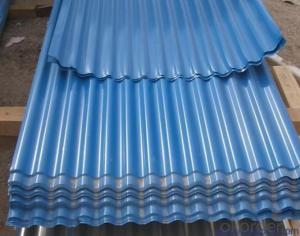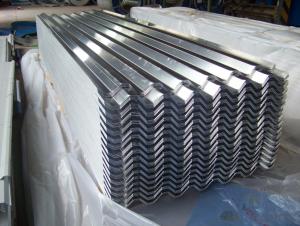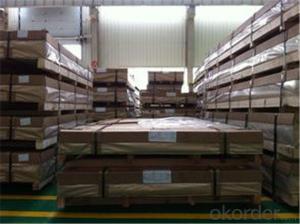Aluminum Corrugated Sheets - Coated Aluminum Roof Panels AA5XXX
- Loading Port:
- China Main Port
- Payment Terms:
- TT OR LC
- Min Order Qty:
- -
- Supply Capability:
- -
OKorder Service Pledge
OKorder Financial Service
You Might Also Like
Aluminium Foil Anti-Corrosion Heat Insulation Roofing Sheet is made of stone powder,
and more than 10 different kinds of inorganic chemical materials with the inside backbone fabric glass cloth.
It features high strength, beautiful, durable in use, fireproofing, frost resisting, corrosion resisting etc,
and the product life could reach more than 20 years; it has overwhelming performance advantages
over the other traditional roofing materials, such as asbestos roofing sheet, glass fiber roofing sheet,
cement roofing sheet and steel roofing sheet. The Product has past the test of PuYang City Quality
Supervision and Inspection Center, each performance index has reached and exceed JC / T747-2002
national standard.
| Big Wave | Medium Wave | Small Wave | |
| Length | 1000 mm -7000 mm | 1800, 2400, 3000 mm | 2400 mm |
| Width | 970 mm | 970 mm | 720 mm |
| Tickness | 4.5-6 mm | 4.5-6 mm | 4-6 mm |
| Wave Height | 55 mm | 40 mm | 25 mm |
| Wave Number | 4.5 | 7.5 | 11.5 |
| Wave Distance | 200 mm | 100 mm | 50 mm |
| Weight/ M | 9-11 kg | 9-11 kg | 7-9 kg |
- Q: This question asks for an overview of the various types of coatings applied to aluminum profiles used in exterior cladding systems.
- <p>Aluminum profiles for exterior cladding are often coated to enhance their durability, weather resistance, and aesthetic appeal. Common types of coatings include: 1. Anodizing, which creates a protective oxide layer on the aluminum surface. 2. Powder coating, a popular method that provides a durable and colorful finish. 3. Fluorocarbon coating, known for its excellent weathering and UV resistance. 4. PVDF (Polyvinylidene Fluoride) coating, highly resistant to chemicals and suitable for marine environments. 5. Electrophoretic coating, which offers a smooth, even finish. 6. Hot-dip galvanizing, a process that coats aluminum with a protective layer of zinc. Each coating type has specific advantages and is chosen based on the performance requirements and environmental conditions of the project.</p>
- Q: the amp setting when welding aluminum tig? and what color should the electrode feeder be bronze or chrome grey? u know the one u use with your hands
- Best electrodes to use for Aluminum welding is 1.5% lanthanum oxide (gold color code.). 2% zirconia (brown) or 2% thorium oxide (red) can also be used. Note that zirconia-doped electrodes should never be used for DC welding. A lot of welders like to quote offhand the rule 1 amp for every 0.001 inch of thickness. This applies to steel, stainless, and nickel alloys only. Due to the lower melting point, lower specific heat capacity, and higher thermal conductivity of of Al, this rule should NOT be used for Al! I recommend welding a test piece first with the same joint configuration and thickness of the part you intend to weld. Note that fillet welds require more current than butt welds or edge welds. Start out by using 2/3 amp per 0.001 of thickness, in other words, reduce the current of the above rule by about 30-40% . Make 3 test weld, then check to see if there's any visible penetration on the other side. If you don't see any through-pentration at all, increase the current by about 10-20 amps and test again.
- Q: 1mm the aluminum plate is pulled to the height of 45mm. Can I pull it out at 1? How much space should I put in?
- Aluminum sheet material, 1100, 1060, 3003, 5052, 5083, 6061, 8011, 7075 and so on.The thickness of aluminum plate is 0.15mm-500mm, width is 100mm-2000mm, length is: 1000mm-9000mm,Aluminum roll thickness is 0.05mm-15mm, width is: 15mm-2000mmThickness of insulated aluminium plate: 0.3mm-0.9mm width: 500mm-1000mm length: no limitNon slip pattern aluminum plate thickness: 1mm-10mm width: 1000mm-1500mm length: 2000-3000mmEmbossed aluminum plate thickness: 0.1mm-0.9mm width: 500mm-1200mm length: UnlimitedAluminum tube specification: outside diameter range: Phi 3mm to Phi 500mm, wall thickness range: 3mm ~ 50mm, aluminum square tube specification: 10mm*10mm to 200mm*200mm, wall thickness range: 3mm ~ 20mm
- Q: Can aluminum sheet be used for medical applications?
- Yes, aluminum sheet can be used for certain medical applications. Aluminum is a lightweight and durable material that is resistant to corrosion, making it suitable for various medical devices and equipment. For example, aluminum sheets can be used for manufacturing prosthetic limbs, braces, and orthopedic implants. Additionally, aluminum can be used in the production of medical instruments, such as surgical trays, sterilization containers, and imaging equipment. However, it is important to note that aluminum may not be suitable for all medical applications, as certain medical devices may require specific properties or materials to meet regulatory standards and ensure patient safety. Therefore, the use of aluminum sheet in medical applications should be determined on a case-by-case basis, considering the specific requirements and regulations of each application.
- Q: Is it possible to use aluminum sheets for roofing purposes?
- <p>Yes, aluminum sheets can be used as roofing materials. They are known for their durability, lightweight, and resistance to corrosion. Aluminum is also recyclable and can be coated with various finishes to enhance its appearance and performance. It is a popular choice for both residential and commercial roofing due to its low maintenance requirements and long lifespan.</p>
- Q: What are the different surface patterns or textures available for aluminum sheets?
- Aluminum sheets come in various surface patterns and textures, each designed for specific purposes and offering unique aesthetic appeal. Some commonly used surface patterns for aluminum sheets are as follows: 1. Smooth: These sheets have a flat and polished surface without any visible patterns or textures. They are ideal for applications that require a clean and sleek appearance, such as architectural elements or interior design. 2. Diamond Plate: These sheets have a raised diamond pattern on the surface, providing excellent traction and slip resistance. They are commonly used for flooring, stairs, ramps, and industrial applications where grip and durability are essential. 3. Brushed: These sheets have a consistent linear pattern created by brushing the surface with fine abrasive pads. This finish gives a satin-like appearance, making it popular for decorative purposes like signs, furniture, appliances, and automotive trim. 4. Stucco: These sheets have a raised pattern that resembles a stucco wall finish. The texture is achieved by embossing the sheet with a stucco roller, creating a rough and durable surface. Stucco patterned sheets are commonly used for exterior cladding, roofing, and decorative applications. 5. Hammered: These sheets have a unique texture that resembles the surface of hammered metal. The finish is achieved by imprinting the sheet with a pattern of small indentations using a hammer or similar tool. Hammered sheets are often used for decorative purposes, such as backsplashes, countertops, and art installations. 6. Perforated: These sheets have a pattern of small holes punched into the surface, allowing for airflow, light transmission, and sound absorption. They are commonly used for architectural elements, screens, filters, and ventilation systems. These examples represent just a fraction of the surface patterns and textures available for aluminum sheets. Each texture serves a specific purpose and offers distinct visual appeal, enabling a wide range of applications in various industries.
- Q: Are 101 aluminum sheets resistant to UV radiation?
- Yes, 101 aluminum sheets are generally resistant to UV radiation. Aluminum naturally forms a thin oxide layer on its surface, which acts as a protective barrier against UV rays. This oxide layer helps to prevent the aluminum from corroding or degrading when exposed to sunlight. However, it is important to note that prolonged exposure to intense UV radiation can still cause some discoloration or fading over time. Therefore, if the aluminum sheets will be continuously exposed to direct sunlight for extended periods, it may be advisable to apply a protective coating or use a specialized UV-resistant paint to further enhance their resistance to UV radiation.
- Q: Are aluminum sheets suitable for use in harsh chemical environments?
- Aluminum sheets are indeed suitable for usage in harsh chemical environments. Their remarkable resistance to numerous chemicals, including acids, alkalis, and organic solvents, is noteworthy. The formation of a protective oxide layer on the surface of aluminum aids in preventing corrosion. Moreover, aluminum's lightweight nature, durability, and cost-effectiveness have contributed to its widespread use in various industrial applications within harsh chemical environments. Nevertheless, it is essential to acknowledge that the appropriateness of aluminum sheets in particular chemical environments may also be influenced by factors such as temperature, concentration, and duration of exposure to the chemicals. To ensure the proper selection of materials for a given chemical environment, it is always advisable to consult experts or refer to specific chemical compatibility charts.
- Q: What is the difference between the alloy 1060H24 aluminum plate and the alloy 1100H24 aluminum plate?
- The difference between the two is very small, 1060 and 1100 are 1 pure aluminum plate, H24 aluminum sheet, that is, the degree of hardness!Specific differences are as follows:Series: 1000 series aluminum alloy represents the 1050, 1060 and 1100 series.
- Q: Are the aluminum sheets suitable for manufacturing audio speaker enclosures?
- Yes, aluminum sheets are suitable for manufacturing audio speaker enclosures. Aluminum is a lightweight and durable material that is commonly used in the production of speaker enclosures. It has excellent acoustic properties, allowing for clear and accurate sound reproduction. Additionally, aluminum is resistant to corrosion, which ensures the longevity of the speaker enclosure. Furthermore, aluminum can be easily molded and shaped into various designs, allowing for flexibility in the manufacturing process. Overall, aluminum sheets are a suitable choice for manufacturing audio speaker enclosures due to their acoustic properties, durability, and versatility.
Send your message to us
Aluminum Corrugated Sheets - Coated Aluminum Roof Panels AA5XXX
- Loading Port:
- China Main Port
- Payment Terms:
- TT OR LC
- Min Order Qty:
- -
- Supply Capability:
- -
OKorder Service Pledge
OKorder Financial Service
Similar products
Hot products
Hot Searches
Related keywords
